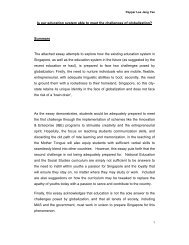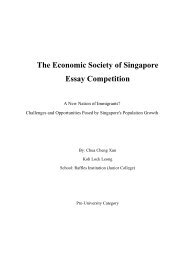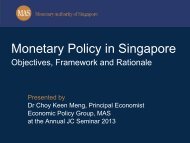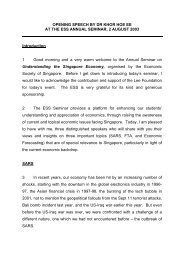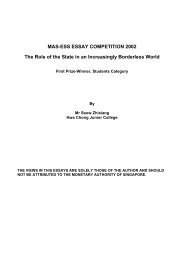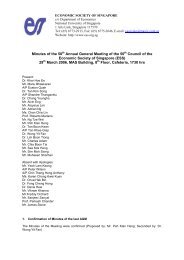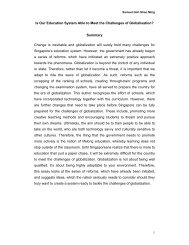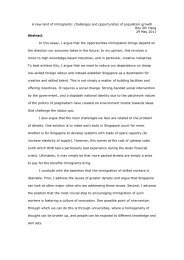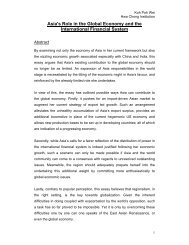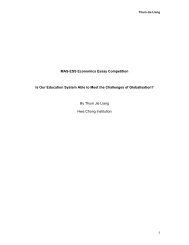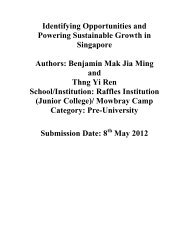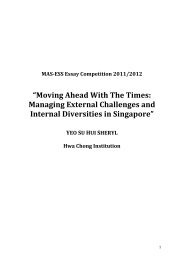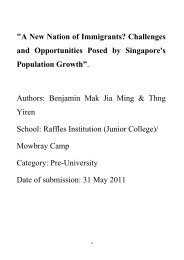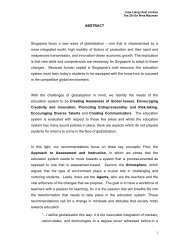the role of the state in an increasingly borderless world - Economic ...
the role of the state in an increasingly borderless world - Economic ...
the role of the state in an increasingly borderless world - Economic ...
- No tags were found...
Create successful ePaper yourself
Turn your PDF publications into a flip-book with our unique Google optimized e-Paper software.
International Competition: Dim<strong>in</strong>ish<strong>in</strong>g <strong>state</strong> capacities<br />
We should first beg<strong>in</strong> by consider<strong>in</strong>g <strong>the</strong> key <strong>an</strong>alytical argument about <strong>the</strong> impact <strong>of</strong><br />
openness <strong>an</strong>d <strong>in</strong>terconnectedness on <strong>the</strong> <strong>state</strong> capacities. The assumption is that <strong>state</strong><br />
capacity is <strong>an</strong> <strong>in</strong>verse function <strong>of</strong> economic <strong>in</strong>tegration; <strong>the</strong> more open or <strong>in</strong>ternationalised <strong>an</strong><br />
economy, <strong>the</strong> weaker <strong>the</strong> <strong>state</strong>’s capacity to govern <strong>in</strong>dustrial ch<strong>an</strong>ge. The argument goes<br />
someth<strong>in</strong>g like this: <strong>in</strong>creased permeability <strong>of</strong> <strong>state</strong> borders exposes private agents <strong>an</strong>d<br />
governments to greater degrees <strong>of</strong> <strong>in</strong>ternational competition, not just <strong>in</strong> <strong>the</strong> goods market, but<br />
also <strong>in</strong> <strong>the</strong> markets for factors <strong>of</strong> production. Labour <strong>an</strong>d capital – <strong>the</strong> two mobile factors <strong>of</strong><br />
production -- will flow to countries that <strong>of</strong>fer <strong>the</strong> highest rate <strong>of</strong> return.<br />
State capacities are f<strong>in</strong><strong>an</strong>ced by taxation, <strong>an</strong>d revenues are raised by taxes on<br />
productive factors. S<strong>in</strong>ce <strong>in</strong>terdependence forces fierce competition among <strong>state</strong>s to attract<br />
<strong>the</strong>se factors, <strong>an</strong>d because owners <strong>of</strong> mobile factors c<strong>an</strong> vote with <strong>the</strong>ir feet, what results is <strong>an</strong><br />
<strong>in</strong>ternational “tax competition” which exerts a huge downward pressure on <strong>state</strong> revenues.<br />
Owners <strong>of</strong> capital <strong>an</strong>d highly skilled pr<strong>of</strong>essionals are free to take <strong>the</strong>ir resources where <strong>the</strong>re<br />
<strong>the</strong>y are most <strong>in</strong> dem<strong>an</strong>d. <strong>Economic</strong> <strong>in</strong>tegration allows capital <strong>an</strong>d skills to migrate to low tax<br />
jurisdictions, <strong>an</strong>d so <strong>the</strong> <strong>state</strong>’s tax base will <strong>in</strong>variably shr<strong>in</strong>k. Governments will f<strong>in</strong>d <strong>the</strong>mselves<br />
unable to f<strong>in</strong><strong>an</strong>ce social programmes, safety nets or redistribution <strong>of</strong> <strong>in</strong>come. Anticipat<strong>in</strong>g this<br />
flight <strong>of</strong> capital <strong>an</strong>d skills, governments have to cut taxes <strong>an</strong>d dism<strong>an</strong>tle <strong>the</strong> welfare <strong>state</strong> before<br />
migration or mass capital flight gets under way.<br />
Put simply, <strong>in</strong>creas<strong>in</strong>g <strong>borderless</strong>ness limits <strong>state</strong> capacities to act because it limits <strong>the</strong>ir<br />
ability to tax. D<strong>an</strong>i Rodrik argues that “Globalisation has made it exceed<strong>in</strong>gly difficult for<br />
government to provide social <strong>in</strong>sur<strong>an</strong>ce … at present <strong>in</strong>ternational economic <strong>in</strong>tegration is<br />
tak<strong>in</strong>g place aga<strong>in</strong>st a background <strong>of</strong> reced<strong>in</strong>g governments <strong>an</strong>d dim<strong>in</strong>ished social obligations.<br />
The Welfare <strong>state</strong> has been under attack for two decades.” 6<br />
Yet as The Economist po<strong>in</strong>ts out <strong>in</strong> its recent survey <strong>of</strong> globalisation, <strong>the</strong> opposite seems<br />
to be <strong>the</strong> case. In practice, governments around <strong>the</strong> <strong>world</strong> are now collect<strong>in</strong>g more <strong>in</strong> taxes; not<br />
just <strong>in</strong> absolute terms, but <strong>in</strong> proportion to <strong>the</strong>ir economies. The US government collects some<br />
30% <strong>of</strong> GDP <strong>in</strong> taxes, mak<strong>in</strong>g for <strong>an</strong> average <strong>of</strong> US$30,000 per household. Sweden, despite a<br />
much vaunted taxpayer revolt <strong>in</strong> <strong>the</strong> 1990s, taxes up to 57% <strong>of</strong> GDP, <strong>an</strong>d Denmark follows<br />
closely with 53%. These are all examples <strong>of</strong> extremely open economies. Denmark’s ratio <strong>of</strong><br />
imports to national <strong>in</strong>come, for example, is 33% compared to <strong>the</strong> US’ 14%. 7<br />
How do we expla<strong>in</strong> this apparent <strong>an</strong>omaly The immediate thought is that perhaps <strong>the</strong><br />
<strong>world</strong> is not quite as <strong>borderless</strong> as it has been made out to be, perhaps because <strong>of</strong> a good deal<br />
<strong>of</strong> stick<strong>in</strong>ess <strong>in</strong> <strong>in</strong>ternational labour <strong>an</strong>d capital markets. But this is clearly not <strong>the</strong> case for<br />
capital, much <strong>of</strong> which moves seamlessly across <strong>the</strong> globe at <strong>the</strong> touch <strong>of</strong> a button.<br />
Stick<strong>in</strong>ess is actually a reality for <strong>the</strong> majority <strong>of</strong> workers, who are tied to geographical<br />
locations by national regulations. However it does not apply so much to highly paid<br />
pr<strong>of</strong>essionals whose skills make <strong>the</strong>m globally mobile, <strong>an</strong>d whose <strong>in</strong>comes put <strong>the</strong>m <strong>in</strong> <strong>the</strong><br />
highest tax brackets, ensur<strong>in</strong>g that <strong>the</strong>y pay <strong>the</strong> bulk <strong>of</strong> national tax bills. While <strong>the</strong>re is <strong>in</strong>deed<br />
some evidence to show that labour mobility has precipitated a move from direct to <strong>in</strong>direct<br />
taxation – <strong>borderless</strong>ness seems more to have affected <strong>the</strong> structure <strong>of</strong> tax code as opposed to<br />
<strong>the</strong> overall burden <strong>of</strong> taxation.<br />
What keeps <strong>the</strong>se highly mobile pr<strong>of</strong>essionals from flee<strong>in</strong>g to low tax havens Some<br />
po<strong>in</strong>t to a flaw <strong>in</strong> <strong>the</strong> fundamental assumption <strong>of</strong> <strong>the</strong> <strong>an</strong>alytical argument presented above – that<br />
6 Quoted <strong>in</strong> “Is Government Disappear<strong>in</strong>g”, The Economist Survey <strong>of</strong> Globalisation, p. 2.<br />
7 Figures cited <strong>in</strong> “Is Government Disappear<strong>in</strong>g”, The Economist Survey <strong>of</strong> Globalisation, p. 1.<br />
28



